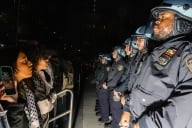You have /5 articles left.
Sign up for a free account or log in.
Two weeks after my lab locked down in the early days of the COVID-19 pandemic, my application for one Ph.D. program was rejected, and I was waiting to hear back from another. The days ticked slowly by.
On April 14, the day before many programs send acceptance notifications each year, I worked up the courage to send a follow-up email. The response came in less than 20 minutes.
As I read the reply and realized I would not get into the program, my chest tightened and my home suddenly felt too small. COVID-19 headlines, cases and deaths crowded my computer screen, their weight juxtaposed against my disappointing news that seemed so small in comparison. I wanted to escape, but under lockdown in Florida, I couldn’t get very far. So I paced the 18 steps from one end of my apartment to the other. When I needed more space to breathe, I found myself walking to and from the stop sign at the end of the street.
After discussions with my wife, who at the time was two years into her own Ph.D. program, I decided to hold off reapplying until she finished to avoid the two-body problem. In the subsequent months, I researched online master’s programs in biotechnology, hoping to expand my skill set and become more marketable. I took classes from a prestigious online program, only to discover two semesters in that it wasn’t a good fit for me.
Two years later, I was still floundering. Each spring I would brace myself as Twitter and Facebook exploded with announcements from successful Ph.D. applicants. And each year I’ve quietly relived the loss and grief surrounding my rejected applications.
Given the death of my brother when I was 12, the ongoing pandemic, school shooting epidemics and life-threatening climate change, grief over my rejection letters seemed petty and insignificant, a sentiment inadvertently reinforced by well-meaning loved ones trying to offer comfort with words like, “At least you still have your job,” or “At least you’re not on a ventilator suffocating in a hospital room by yourself.” Sharing my loss felt taboo, so I tried to ignore it and hold my chin high.
But because I didn’t talk about my loss and its resulting grief, I never learned how to adequately express what I was feeling. It wasn’t until last October, when I was attending the ScienceWriters2022 conference in Memphis, that I started to find the right words.
During one of the sessions, St. Jude social worker Erica Sirrine spoke of how nondeath loss often leads to “disenfranchised grief,” a term coined by bereavement expert Kenneth Doka, who defined it as “grief experienced by those who incur a loss that is not, or cannot be, openly acknowledged, publicly mourned or socially supported. Isolated in bereavement, it can be much more difficult to mourn and reactions are often complicated.” Those words opened my eyes, not only to my experience but also that of thousands of students who aren’t accepted into a Ph.D. program each year. Reflected in those words was the realization that I wasn’t alone.
For every applicant who fist-pumps the air on receiving good news, four others receive rejection letters, according to data from the Council of Graduate Schools. In the U.S., the number of submitted applications swelled to 770,000 in 2021, increasing nearly 9 percent since my own applications were rejected. That number is projected to grow even more, meaning thousands of prospective students will have to grapple with rejection fallout in the coming years. That fallout could mean lost time and opportunities—applicants may not be able to reapply immediately because the next admission cycle might not be for another year. Multiple rounds of rejection can further delay career plans or even derail them altogether. For many, the degree can be important not only for applicants’ careers, but also for their identities and perceived self-worth.
Now, three years after my applications were rejected, I’m doing science writing and working as a lab technician where I would have been a student had my application been accepted. But I still mourn the time and other opportunities I’ve lost. I lament what could have been, had I given myself permission to grieve. But only once I had a name for my grief could I begin to understand what I was feeling.
I wish my rejection letters had helped me find those words. Faculty, when you send form letters acknowledging the time and energy put into applications, please also acknowledge the impact your decision—and those notifications—may have on the recipients. Be transparent. Rather than simply writing, “I am sorry that we are unable to offer you a spot in our program,” help us find some reassurance by saying something like, “We recognize the impact our decision has on your personal and career goals and wish to emphasize that this outcome in no way reflects your self-worth or abilities. We understand our decision may elicit feelings of loss and grief—please know these feelings are both natural and legitimate.”
Institutions can help further by offering grief support resources, such as this article highlighting the importance of mourning losses even when they seem small. This could be as simple as introducing us to the vocabulary of disenfranchised grief so we can start making meaning of our feelings. Just naming grief helps normalize the experience and decrease feelings of isolation.
Such simple, compassionate validation can help frame rejection notifications as a real and socially accepted loss, thereby granting us space to grieve and offering the first round of social support we need to find closure.
When I shared the importance of closure to work through grief with my wife, she suggested that I print out my rejection emails and burn them. I seriously considered it. The crackling of the fire would be cathartic and powerfully symbolic with the finality of its light and warmth.
I haven’t done it yet. Someday, maybe. For now, these words will do.








